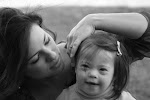There was a surgical doctor in the NICU that kept referring to generalities in babies with Down syndrome when managing Bridget's hospital care. He was full of doubt, and had a general unwillingness to look at Bridget as an individual.
This particular doctor was certain that Bridget would struggle eating on her own. (My instincts told me the opposite. She sent me every signal she could that she was very interested in eating by mouth.)
When Bridget was less than two weeks old (35 1/2 weeks gestational age), the surgeon delivered a huge blow to our optimism as he said flatly, "These kids tend not to do well eating by mouth. I'd like your permission to pop a G-tube in her, and send her home."
This doctor wanted to surgically implant a feeding tube in her stomach based on trends and generalities--and stereotypes. I understood that his desire to release her from the hospital was due--at least in part--to both the high cost of intensive care, and risk of infection in the hospital setting. She had almost completely recovered from her surgery, and since she was no longer a "surgical patient", he felt she should be released. He was ready to give up on her, we were not.
Chris and I felt that Bridget needed--and deserved--at least a little more time in the monitored hospital environment to grow and to work on feeding. She was a preemie, who was having brief spells of Bradycardia (decreased heart rate) and was still over a week away from being considered full-term. Still, she was showing promising signs, and her due date was not for another month.
The sucking reflex, as well as her stamina and alertness, would all likely improve as we got closer to the full-term mark.
We did not give the surgeon permission to insert the G-tube. Instead, we laid out a plan for increasing Bridget's feeds by mouth and began working with the Nutritionist and Occupational Therapists at the hospital to accomplish this. We were moved to a family-centered unit where I could room-in with Bridget and be there to feed her every time. She and I worked tirelessly for two and a half weeks, making steady progress all along. Our combined love and determination paid off. We left the hospital just over a week before Bridget's original due date on full feeds by mouth, and without tubes or monitors of any kind.
**Not all health care professionals were negative about Bridget's prognosis. We received encouragement from multiple doctors, nurses and therapists while at the hospital. We were blessed with a neonatologist who delivered Bridget's diagnosis thoroughly, and with great care and concern. We also have a wonderful pediatrician, a treasured and trusted friend and doctor, who approaches her job with compassion and creativity. She has always believed in Bridget, and in us.
**A major factor in determining when Bridget could be released from the hospital was that she needed take at least 1 1/2 ounce per feeding and show that she was gaining weight. Since she was expending so much energy just to eat, the surgeon mentioned above was convinced that even if she could take the required amount--by mouth--each time, that there was virtually no way she would gain weight.
I nursed all of our children and had tried nursing Bridget. Her swallow was not fully developed and we had to thicken her feeds, so she could not nurse directly from me. I was expressing my milk for her. I researched her nutritional requirements and found out that we could use hindmilk (rather than NeoSure) to boost her caloric intake. Basically, this is where the milk is collected in two parts (the beginning until just about two minutes after let-down, when most of the milk is emptied, and the end, when the milk is richest). The baby is then fed the latter portion, and the "foremilk" is stored for later use. I think this made a big difference in meeting the weight-gaining goal.











Oh, my! It always makes me sad (and even now, a little bit shocked) when I come across a story about so-called professionals. Sometimes its nurses, or doctors, or even, people in the special education field. I dream of the day when we don't have to safeguard against this sort of thing...
ReplyDeletexo